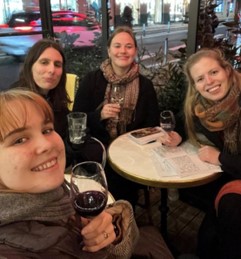‘Students’ Assessment and Sustainable Development’ – reflections by four master’s students

On a cold, grey afternoon in the centre of Paris, administrators, professors, and students from Circle U’s “Think and Do Tank” met to discuss how to create a brighter future for Higher Education in a Changing World. Three presentations were made by researchers and professors from the University of Oslo, Aarhus University and King’s College London.
Professor Lisbeth M. Brevik from the University of Oslo described her course, which is part of the master’s program in teacher’s education at the university. In the course, students are involved as co-researchers in a project that contributes to the research done in the university. They join a research team, visit schools and record interactions in classrooms, and transcribe and analyse the results.
The assessment is continuous and formative, and in particular the students make presentations that are improved through the comments of their peers, and then delivered again in a polished form. The course gives the students training as researchers and skills as presenters. It also prepares the students for constantly reflecting on their own positions as future teachers.
Active learners
Professor Sue Wright presented the course “Anthropology of organisations” that she teaches at Aarhus University. It explores the workings of organizations within current systems of governance. Students are invited to form small groups and specialize on a topic they find most interesting and prepare an hour’s teaching. Students have the opportunity to use creative techniques such as roleplay, quizzes and singing to engage their peers in a discussion of the topic. The course encouraged students to take charge as active learners and reflect on how they are positioned within organizations and their capacity to achieve changes.
Process folio
The third presentation were made by Professor Flora Smyth Zahra and Senior Lecturer Jayne Pearson from King’s College London. They presented their work in integrating concepts from humanities into a study programme that belongs in the Dentistry faculty. Through activities in green spaces and museums and by volunteering, science students are challenged to engage with different epistemologies and deal with uncertainty and complexity. This prompts them to reflect on their role and agency as health professionals. The students make a “process folio” where they reflect on their own learning process and their journey towards becoming health professionals, as well as on their roles as students and people engaging in society.
Students as active learners
It was interesting for us to gain an insight into how academic bureaucracy stands in the way of these initiatives and how, as Sue said, “they need to find place to manoeuvre” in order to do this inside the existing regulations. It almost seems like academic bureaucracy sometimes becomes an obstacle for the realization of sustainable educational initiatives. One can hope that this will be targeted from the top-down so that the bottom-up initiatives get room to grow.
These projects all try to incorporate the students as active learners, and valuable members of the teaching and learning taking place at the universities. All the professors present at the meeting said they wanted to make their students reflective citizens of the society.
The three projects sought to form their teaching in new ways so that the students’ assessments fitted how the course was taught. Their wish and the wish from more of the professors in the room was for assessment to be a space where students could show what they had learned, or even explore things that they did not realise they had learned! In that way assessments can promote and support sustainable education and be an actual part of it instead of working against it.